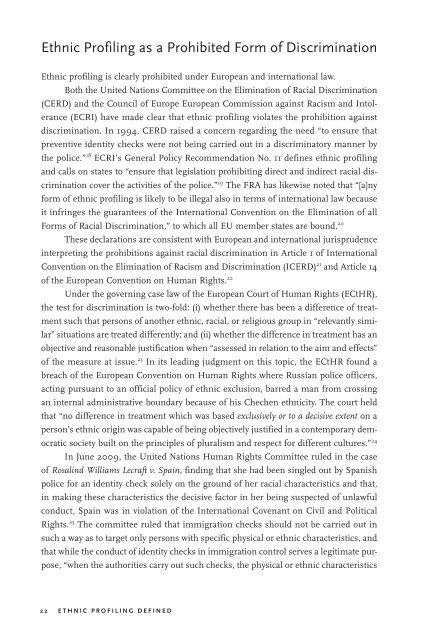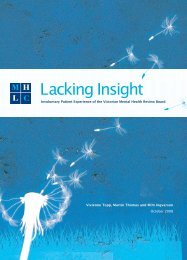Reducing Ethnic Profiling in the European Union - Open Society ...
Reducing Ethnic Profiling in the European Union - Open Society ...
Reducing Ethnic Profiling in the European Union - Open Society ...
- No tags were found...
Create successful ePaper yourself
Turn your PDF publications into a flip-book with our unique Google optimized e-Paper software.
<strong>Ethnic</strong> <strong>Profil<strong>in</strong>g</strong> as a Prohibited Form of Discrim<strong>in</strong>ation<strong>Ethnic</strong> profil<strong>in</strong>g is clearly prohibited under <strong>European</strong> and <strong>in</strong>ternational law.Both <strong>the</strong> United Nations Committee on <strong>the</strong> Elim<strong>in</strong>ation of Racial Discrim<strong>in</strong>ation(CERD) and <strong>the</strong> Council of Europe <strong>European</strong> Commission aga<strong>in</strong>st Racism and Intolerance(ECRI) have made clear that ethnic profil<strong>in</strong>g violates <strong>the</strong> prohibition aga<strong>in</strong>stdiscrim<strong>in</strong>ation. In 1994, CERD raised a concern regard<strong>in</strong>g <strong>the</strong> need “to ensure thatpreventive identity checks were not be<strong>in</strong>g carried out <strong>in</strong> a discrim<strong>in</strong>atory manner by<strong>the</strong> police.” 18 ECRI’s General Policy Recommendation No. 11 def<strong>in</strong>es ethnic profil<strong>in</strong>gand calls on states to “ensure that legislation prohibit<strong>in</strong>g direct and <strong>in</strong>direct racial discrim<strong>in</strong>ationcover <strong>the</strong> activities of <strong>the</strong> police.” 19 The FRA has likewise noted that “[a]nyform of ethnic profil<strong>in</strong>g is likely to be illegal also <strong>in</strong> terms of <strong>in</strong>ternational law becauseit <strong>in</strong>fr<strong>in</strong>ges <strong>the</strong> guarantees of <strong>the</strong> International Convention on <strong>the</strong> Elim<strong>in</strong>ation of allForms of Racial Discrim<strong>in</strong>ation,” to which all EU member states are bound. 20These declarations are consistent with <strong>European</strong> and <strong>in</strong>ternational jurisprudence<strong>in</strong>terpret<strong>in</strong>g <strong>the</strong> prohibitions aga<strong>in</strong>st racial discrim<strong>in</strong>ation <strong>in</strong> Article 1 of InternationalConvention on <strong>the</strong> Elim<strong>in</strong>ation of Racism and Discrim<strong>in</strong>ation (ICERD) 21 and Article 14of <strong>the</strong> <strong>European</strong> Convention on Human Rights. 22Under <strong>the</strong> govern<strong>in</strong>g case law of <strong>the</strong> <strong>European</strong> Court of Human Rights (ECtHR),<strong>the</strong> test for discrim<strong>in</strong>ation is two-fold: (i) whe<strong>the</strong>r <strong>the</strong>re has been a difference of treatmentsuch that persons of ano<strong>the</strong>r ethnic, racial, or religious group <strong>in</strong> “relevantly similar”situations are treated differently; and (ii) whe<strong>the</strong>r <strong>the</strong> difference <strong>in</strong> treatment has anobjective and reasonable justification when “assessed <strong>in</strong> relation to <strong>the</strong> aim and effects”of <strong>the</strong> measure at issue. 23 In its lead<strong>in</strong>g judgment on this topic, <strong>the</strong> ECtHR found abreach of <strong>the</strong> <strong>European</strong> Convention on Human Rights where Russian police officers,act<strong>in</strong>g pursuant to an official policy of ethnic exclusion, barred a man from cross<strong>in</strong>gan <strong>in</strong>ternal adm<strong>in</strong>istrative boundary because of his Chechen ethnicity. The court heldthat “no difference <strong>in</strong> treatment which was based exclusively or to a decisive extent on aperson’s ethnic orig<strong>in</strong> was capable of be<strong>in</strong>g objectively justified <strong>in</strong> a contemporary democraticsociety built on <strong>the</strong> pr<strong>in</strong>ciples of pluralism and respect for different cultures.” 24In June 2009, <strong>the</strong> United Nations Human Rights Committee ruled <strong>in</strong> <strong>the</strong> caseof Rosal<strong>in</strong>d Williams Lecraft v. Spa<strong>in</strong>, f<strong>in</strong>d<strong>in</strong>g that she had been s<strong>in</strong>gled out by Spanishpolice for an identity check solely on <strong>the</strong> ground of her racial characteristics and that,<strong>in</strong> mak<strong>in</strong>g <strong>the</strong>se characteristics <strong>the</strong> decisive factor <strong>in</strong> her be<strong>in</strong>g suspected of unlawfulconduct, Spa<strong>in</strong> was <strong>in</strong> violation of <strong>the</strong> International Covenant on Civil and PoliticalRights. 25 The committee ruled that immigration checks should not be carried out <strong>in</strong>such a way as to target only persons with specific physical or ethnic characteristics, andthat while <strong>the</strong> conduct of identity checks <strong>in</strong> immigration control serves a legitimate purpose,“when <strong>the</strong> authorities carry out such checks, <strong>the</strong> physical or ethnic characteristics22 ETHNIC PROFILING DEFINED
















